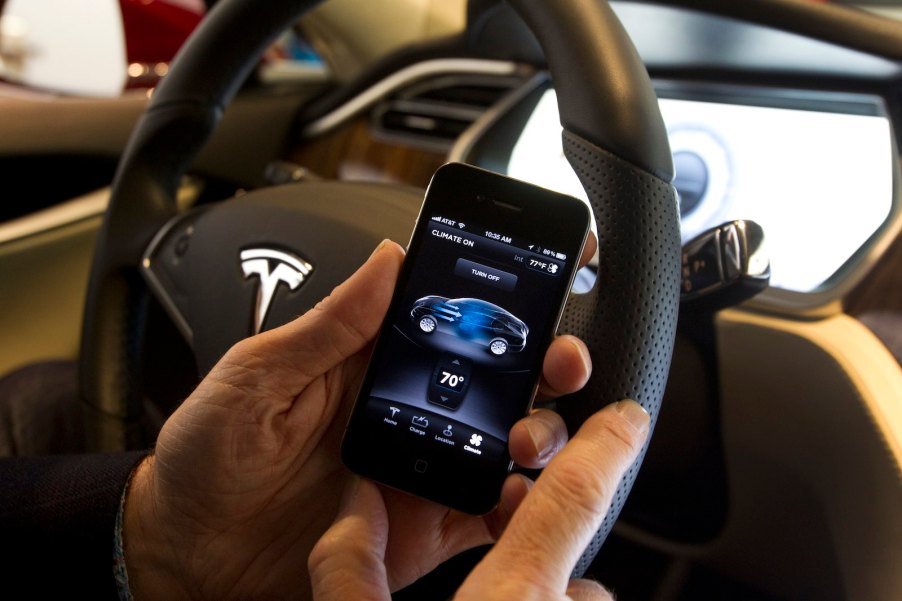
Here’s the Real Reason Tesla Employees May No Longer Be Allowed to Carry iPhones
You may have already read the headline: Elon Musk threatens to ban his employees from bringing Apple devices to work at Tesla or X (née Twitter) if Apple integrates Open AI’s “Chat GPT” into Siri. While Musk claims he has security concerns, he was also one of Open AI’s founders and is feuding with its current CEO. [Note that Elon Musk hasn’t said anything about changing whether iPhones and other Apple devices can connect to Tesla automobiles].
In the early 2010s, a young entrepreneur named Sam Altman joined Elon Musk’s tour of SpaceX. He said, “The thing that sticks in memory was the look of absolute certainty on his face when he talked about sending large rockets to Mars…I left thinking ‘Huh, so that’s the benchmark for what conviction looks like.'”
In 2014, Altman emailed Musk about Google’s AI project. Showing the same conviction, he insisted the tech giant was the wrong company to be trusted with as dangerous a technology as general artificial intelligence. The two men agreed that the “someone other Google” should be, well, themselves.
They decided to found a nonprofit with the mission of benefiting humanity–by creating AI first and distributing it widely. Their reasoning was that if they were in control, they could build a safer AI. Elon Musk joined the board and threw $45 million into the pot. Altman told the press, “I really trust him.” So far so good.

Over time, Musk grew impatient with the organization’s lack of progress. He suggested he become the executive. He suggested folding it into Tesla. In 2018, he told the founders, “My probability assessment of OpenAI being relevant to DeepMind/Google without a dramatic change in execution and resources is 0%. Not 1%. I wish it were otherwise.” When they ignored him, he left the board.
In November 2022, Open AI released its Chat GPT chatbot and the Beta test was so wildly successful it became a household name overnight.
Was Elon Musk’s response a hearty congratulations? Far from. He wasted no time suing Open AI. He argued that the company, which now includes a for-profit subsidiary under its larger nonprofit umbrella has “breached the founding agreement.” He cited the company’s decision to partner with Microsoft (though he once urged it to partner with Tesla) and warns its pursuit of general AI poses “perhaps the greatest existential threat we face today.”
Musk also pointed out that Open AI is no longer offering all its proprietary software to the public, like other “open source” companies do. This original goal was so foundational, it’s how the organization got its name.
Sam Altman responded by publishing a series of emails between him and Musk. These emails show that while Musk was on the board, he supported a pivot to a for-profit company. He also recognized that the open source model might not be feasible–or safe–for Open AI.
None of this really matters. Musk’s lawsuit didn’t present any binding contract Altman signed, so it has no real legal foundation.
Meanwhile, Elon Musk launched a competing chatbot: It’s named “Grok” and its on his social media platform “X” (previously called Twitter).
When Apple announced it was partnering with Open AI, Elon Musk didn’t mince words. “Apple has no clue what’s actually going on once they hand your data over to OpenAI. They’re selling you down the river.” He said the partnership posed such a big security threat, that he wouldn’t allow iPhones into any of his companies’ facilities. Considering that Elon Musk has a long, contentious history with Open AI–and is invested in one of its biggest competitors–you might want to take his statements on the partnership with a grain of salt.
The ultimate irony would be if Grok partners with Google, maker of the Android phones. That would put the best AI Elon Musk can build in the hands of the company that her originally said shouldn’t have it.
Next, read why Tesla’s board has bigger problems than Musk’s drug use, or see what Elon Musk said about the Apple/Open AI deal in the video below:



